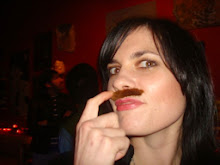The summer after I graduated from college, my family went to Galveston for a family reunion.
At some point in the afternoon, my mother, brothers and sister were all in the ocean, leaving my father and I alone on the beach. At some point, my father turned to me, and I've never forgotten what he said.
"If you want to sing in a bar band for the rest of your life, I don't care as long as it makes you happy."
I'd been singing since before the moment when memories are formed. As a very small girl, I sang and hummed incessantly. I loved it. It drove most everyone else crazy. I once stood up in the middle of a lesson in kindergarten, pushed in my chair ceremoniously, and began to sing for the class with my head held high. I was told this story by my mother, and, knowing me, I'd probably been sitting there for ten minutes fantasizing about performing as a famous adult and completely forgotten I was actually a five-year-old in class. It was an integral part of who I was--both the singing and the dreaming. So when my father told me he'd be happy with me singing for nothing for the rest of my life, it struck me as one of the sweetest things I'd ever been told.
And it was one of those rare moments when one feels completely seen.
Singing for nothing wasn't my father's dream for me. I knew that, given the option and complete control, he'd have chosen I be a lawyer like him or something similar. But my father knew me. To this day, some 13 years later, he still refers to me as his "artsy" daughter. "Artsy" is code for "unconventional" in pretty much every way. He knew me then, at 18, and he still knows me.
A few years ago I got sober. I'd been drinking for so long I didn't know what anxiety felt like anymore. One day I was sitting in my parents' den with my father when I realized I felt anxious. I was shocked. Drinking always made me feel "laid back." I said, "I feel anxious!" out loud because I was so impressed with the level of anxiety and the alien experience.
"You've always been anxious, even when you were a little kid."
It was in that moment that I realized again how well my father knew me. It felt almost as if he knew me better than I did, or at least was able to remember things about me that I'd purposefully tried to forget. I always thought I'd done such a good job at pretending like I didn't care to cover up all the anxiety, and as far as most people were concerned, I probably had. My father had noticed it, though. His little artsy, anxious daughter.
I remember these moments because there was no judgment in them. Would my father have wished me less anxious? Would he have wished I be more ambitious in making money? Would he want me to be more like him in these ways I was different? One would think so. This is what we always hear about parents. But he pointed out these things as matters of fact. I remember these moments because they were the ultimate acts of love--he saw who I was without putting the limits of his own opinions or wishful thinking around what he saw. He wasn't blinded by denial, and he wasn't admonishing with disappointment. He was simply pointing me out.
No one feels more loved than when they are simply noticed when they think that no one is looking.
I try to remember this. I want to give this to other people. At times I fail. I'm sure that at times my father failed. What's interesting is that I can so clearly remember these specific moments when he saw who I really was, but I can't think of a specific instance in which he failed. This isn't to say he's always approving, but even in his disapproval I can feel the love in that he will still care about me even as I do the thing of which he disapproves. It is not in his approval that I feel loved. It is in his awareness of the reality of me that I feel loved.
So much of what we think we see in people is actually what we make up about those people based on our own assumptions. When we see past those assumptions, we give people the ultimate gift--the freedom of being in love.
A couple of months into our relationship, my boyfriend and I celebrated his birthday together. As we sat on the couch at the end of the night, he leaned in close and said, "I like you just the way you are." I almost cried because a simple, "I like you," can mean so many things. It can mean, "I like who I think you are," or, "I like you, but I have a few reservations." It could mean, "I like you, but there are a couple of things I'd change." It was the "just the way you are" that struck me, partially because years before I'd been asked to whisper into someone's ear the thing I'd always wanted to hear, and he'd said it word-for-word.
Just the way you are is all of you, and all of you wants to be loved.
Being unwanted, unloved, uncared for, forgotten by everybody, I think that is a much greater hunger, a much greater poverty than the person who has nothing to eat.
-Mother Teresa
Thursday, April 1, 2010
Subscribe to:
Post Comments (Atom)


No comments:
Post a Comment